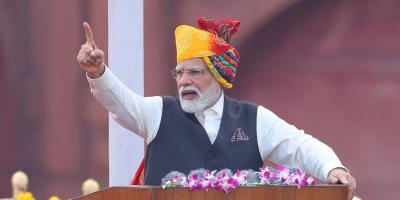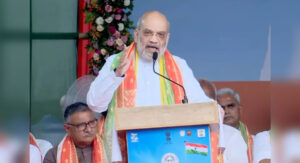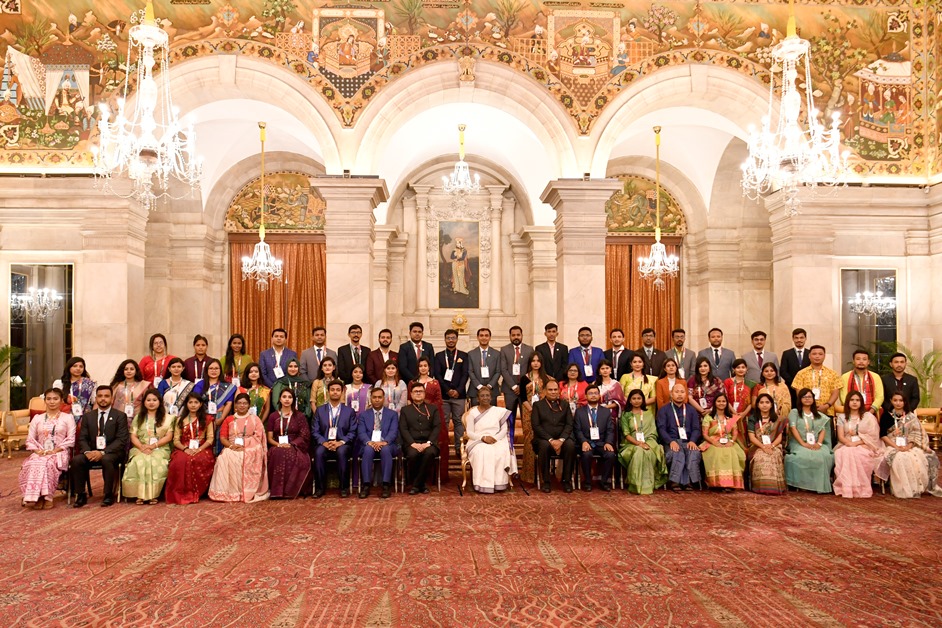Modi must use his global stature to isolate a communal Bangladesh
 KRC TIMES Desk
KRC TIMES Desk

Prabhu Chawla
Is the world religious order crumbling? Amsterdam to Paris and London to New York, vicious, violent mobs of immigrants have launched savage salvos against civilisation. Its new echo chamber is Bangladesh, where a winner of the Nobel Peace Prize seems to deserve the ‘ignoble prize’ for communal carnage.
Ever since Muhammad Yunus, chief adviser to the interim Bangladesh government, was imported to Dhaka from the West, ethnic cleansing of Hindus started on a scale unprecedented since partition.
The communal credentials of the darling of the Western Deep State are no secret: in 2005, he made it to the list of ‘The Muslim 500: The World’s 500 Most Influential Muslims’ compiled by the Amman-based Royal Islamic Strategic Studies Centre. The recent imprisonment of a former ISKCON spiritual leader, Chinmoy Krishna Das, on sedition charges shows the leopard hasn’t changed its spots.
The citation of Yunus’s Nobel reads: “Every single individual on Earth has both the potential and the right to live a decent life. Across cultures and civilisations, Yunus and Grameen Bank have shown that even the poorest of the poor can work to bring about their own development.”
The Yunus paradox is that the man who established and headed the Bangladesh Information Centre in the US to promote the cause of his country’s liberation from Pakistan should now become Islamabad’s puppet and Washington’s lapdog by opening the sea route to Pakistan.
Worse, Yunus, a former founding member of Nelson Mandela’s The Elders—a group set up to “contribute their wisdom, independent leadership and integrity to tackle some of the world’s toughest problems”—presides over communal apartheid in his own country, where eight of every 100 citizens are deprived of their right to live safely.
In the past four months, many prominent Hindu and other minority leaders have been arrested on grounds that would make a walrus laugh.
A puppet of the renewed CIA-ISI nexus, Deep State decoy Yunus hasn’t abandoned his political ambitions although, in 2007, his Nagorik Shakti party was stillborn. Now, Bangladesh is run by the 84-year-old who is standing by malefic fundamentalist insanity.
He has turned India, Bangladesh’s father, from an ally of decades into its most hated foe. He has ignored the Indian generosity of over $10 billion given for Bangladesh’s development. The jihadists ignore that it is India which provides 25 percent of its electricity.
The anti-Modi, liberal Western collaborative umbrella protects Yunus to promote his regime without accountability. Sheikh Hasina was autocratic too. But on Yunus’s watch, most of her cabinet ministers were killed or jailed; the judiciary was purged.
Popular rage stoked by Pakistani provocateurs was directed more against India than Hasina. Yunus ordered the release of jailed anti-India elements, including former PM Khaleda Zia. The regime change led to the reversal of a secular polity by targeting minorities led by Hindus.
After suffering for a couple of months, the Hindu resistance was quelled by brutal force. Loyalists to the Constitution were arrested. ISKCON was banned even after its former leader Chinmoy Krishna Das clarified, “To all Sanatanis, I would like to request our beloved homeland, this Bangladesh—we do not want to leave this country. We are sons of this land. We would like to preserve the heritage and the culture of our land.” His patriotism was ignored.
The influential Bangladesh Hindu Buddhist Christian Unity Council recorded more than 2,000 attacks on Hindus since August 5. The ball is in Modi’s court now to deal with its genocidal neighbour. As the atrocities mount, his government is under immense pressure to take retaliatory and punitive steps.
The Sangh Parivar has accelerated its campaign to complete its unfinished agenda of booting out infiltrators. Since its core causes—construction of the Ram Mandir, abrogation of Article 370, partial implementation of a unified civil code and cultural corrections in the Indian education system—have been resolved, they feel the time has come to oust illegal immigrants from Pakistan and Bangladesh to tame domestic fundamentalism. The number of infiltrators nationwide varies from 20 million to 25 million. The BJP perceives them as vote banks of the Congress and regional parties in Assam and West Bengal.

It was Modi who started the agitation against infiltrators when he was Gujarat CM. At a rally during his campaign for PM in 2014, he charged Manmohan Singh of protecting illegal immigrants: “Prime minister, the country wants to know what are you thinking about Bangladeshi infiltration. What are your policies? Will Bangladeshis have a sway in India?”
After becoming PM, he asserted at his first public meeting in Assam: “I understand the sentiments of Assamese people. Even when it comes to land acquisition, we will bear the national interest in mind and the interest of the people of Assam. I will make such arrangements that Bangladeshis, who infiltrate into Assam and trouble you, are pushed out. I left home to serve my motherland. And the land of Assam is also my mother.”
Illegal intrusion has been a major poll plank of the BJP, even during the latest state elections. Modi declared in Jharkhand, “Bangladeshi and Rohingyas infiltrators have become a major threat to Santhal Parganas and Kolhan regions. The demography of these regions is changing fast. The tribal population is on the decline. The infiltrators are establishing control of the panchayat system, grabbing land, indulging in atrocities on daughters… Each Jharkhand resident is feeling unsafe”.

Amit Shah promised, “Change the government once in Jharkhand. I want to assure you that the BJP will drive out Rohingyas and illegal Bangladeshis from Jharkhand, one by one.” The home ministry is already tracking undocumented Bangladeshis in various cities—over a thousand have been deported. BJP-led state governments have appointed task forces to identify and point out suspicious residents to officials.
Change of regime and deportation aren’t Modi’s only weapons. An economic blockade can force Yunus to dial down the violence. During the 15 years of Hasina’s regime, Bangladesh became India’s largest development partner. It received a credit line of $8 billion for infrastructure development. Bangladeshis are the largest group visiting India for leisure and work. Kolkata is a second home to many. Soon after the attacks on Hindus began, India closed its visa centre in Dhaka, which has seriously impacted local citizens.
Modi must use his global stature to isolate a communal Bangladesh. Its new leaders preach to India to “recalibrate their policy instead of crying foul on their issue. Accept the fact that Bangladesh has moved on, and [you] move on, too”. Modi should definitely retaliate by moving faster and leverage his friendship with Donald Trump to withdraw American support to an extremist Yunus establishment.

During the election, Trump posted on X: “I strongly condemn the barbaric violence against Hindus, Christians and other minorities who are getting attacked and looted by mobs in Bangladesh, which remains in a total state of chaos.” It is now up to Modi to wield the Excalibur of geopolitical power against India’s communal connivers and protect Hindus and other oppressed minorities in other homelands, too, to become the warrior prophet of global Hinduism.
Promotional | KRCBarak FestivalMedia Conclave






